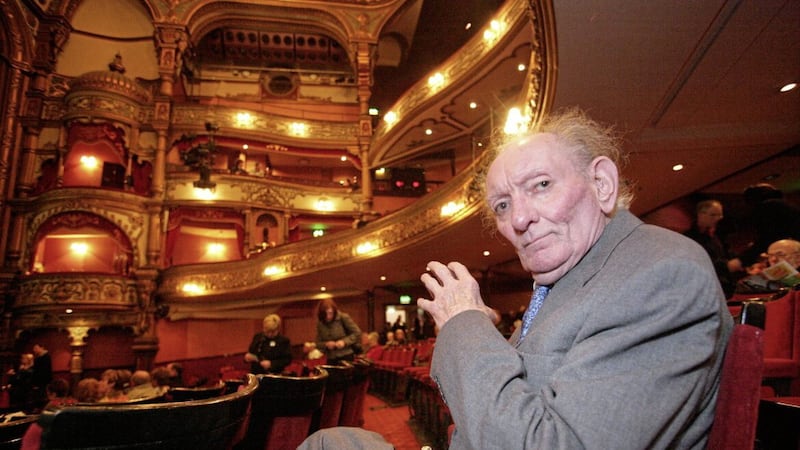‘Treated success and failure alike’? A devoted and learned minder of his work was surely wrong in that.
One of the facets of him that leap out of the marvellous documentary ‘Brian Friel, Shy Man Show Man’ is how the plays drove Friel on, when audiences and critics loved them. And how he was cast down when critics fell on them. When he saw a Broadway audience rise in 1966 to Philadelphia Here I Come, already a roaring triumph in Ireland, he ‘didn’t give a damn what the critics would say’. Lasting success could never erase the flops, like the very next New York production.
Perhaps the point of the comment was that what theatre often counts as failure, the disapproval of influential voices, did not stop him.
Anne, his widow and the star of the documentary - an RTE/BBC production, on BBC iPlayer since last January, much watched and much enjoyed and available for 24 more days – said laughingly of Philadelphia in her unaffected way, ‘If he’d had another hit straight after he’d have said goodbye to me.’ She clearly meant he so loved the life of the theatre, the Broadway buzz. He said himself that the six months in 1963 with Anne and their children in Minneapolis watching Tyrone Guthrie rehearse was his first escape from claustrophobic Ireland.
Anne Friel has some competition from Margo Harkin, Siobhan McSweeney and Stephen Rea, not lugubrious here. Tom Stoppard hugging the frail, ill Friel who uses him as a prop, says of three plays he envies Friel wrote two. Even if university libraries are alien to you, as a top dressing for the documentary you might juke into an exhibition in Queen’s McClay library. Near a Botanic Gardens side gate, just walk in. Nobody eyes you before you decide what to look at first.
Here is Friel the craftsman at his desk at the same time each day, with his ‘loose sheets, copybook or typewriter’. In his diary he calls the desk ‘a construction site’.
He might start with ‘a situation, a historical moment or atmosphere’ but there is ‘no way to stage a nebulous concept.’ So he lists side by side the characteristics of Gar Private and Gar Public, his revolutionary split of Philadelphia’s central role between two actors. No riveting scene blasts out here, no wild dance from Lughnasa. But Friel notes how the actor will show the excitement to make Maggie burst into dancing, yelling ‘come on!’ at her withdrawn sisters.
The pain of in-production friction burns off diary entries during American rehearsals in 1979 of The Faith Healer. An eventual hit back in Dublin with the beautifully talented Donal McCann, but four monologues, no dialogue? Alone in a hotel room Friel writes Ah **** them, though he did not use asterisks.You can read other writers, listen to them read, unfussy, not too expensive. It’s the trouble for playwrights. Plays need productions.
All the same it’s worth peering at how Friel worked on the stage directions that give actors the entire life of their characters. Tiny handwriting, scribbled-out lines of text. But you can get into the digital archive based on the 130 boxes Friel gave the National Library of Ireland, created by Queen’s and the NLI, and squinch those notes up to reading size.
Actors may have few doubts about their meaning. Directors occasionally profess to be confused. But then Friel famously wondered if directors were necessary, since they only became the thing in mid-19th century. He sometimes directed later plays himself. He may have written too much and for too long.
Someone says he became a recluse late on but Margo Harkin remembers Anne and himself visiting them on tour with Translations, checking on them like their parents. And the cards he’d write of encouragement, as to her on her first production; ‘Do it again’. He’s worth, seven years after his death, a big slice of anyone’s time. Come on.








